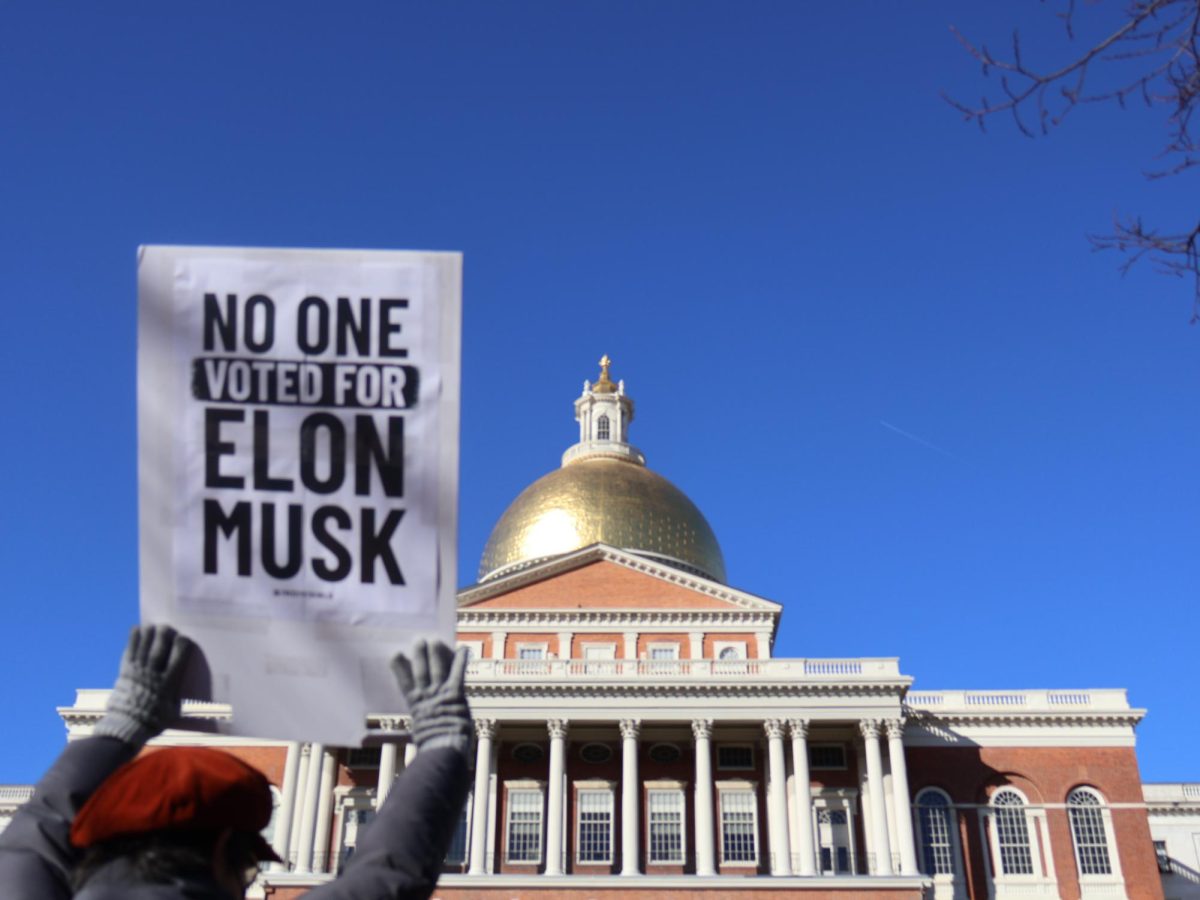Since taking office Jan. 20, President Donald Trump has fundamentally shaken the foundation of the United States more than any other president before him. So far, Trump has signed over 129 executive orders, surpassing Franklin D. Roosevelt’s record of signing 99 executive orders in his first 100 days.
Trump’s executive orders have ranged from cutting federal budgets with the establishment of the Department of Government Efficiency to eliminating diversity, equity and inclusion programs in the federal government, imposing sweeping global tariffs and most recently lifting commercial fishing bans on environmentally protected zones in the Pacific Ocean.
For Suffolk University students, the policies enacted by the second Trump administration have drawn mixed reactions. Some say the president’s actions are undemocratic, while others applaud the shake-up in the political status quo.
“I’m upset and I’m angry about what they are doing, not only to a lot of really important programs, but to simple rights and freedoms and to our democracy overall,” said Joey Pisani, a freshman political science major from Massachusetts.
The Supplemental Nutrition Assistance Program, formerly known as the Food Stamp Program, has recently come under fire from the Trump administration as House Republicans seek to cut $230 billion in funding.
Pisani grew up with his family using SNAP after losing his father at a young age.
“I am here today because of the public programs that Donald Trump is now making it his focus to gut and take away from families,” said Pisani.
Aidan Burns, a junior journalism major from Massachusetts, voted for Trump in 2024 and is feeling overall positive about Trump’s first 100 days. Burns is a Staff Writer for The Suffolk Journal.
“I like a lot about what he is doing with immigration. There are a lot of dangerous people that were allowed to stay here that aren’t here anymore,” Burns said. “Even in Boston, there’s a fair amount of dangerous people who were taken off the streets by ICE under Tom Homan.”
In the first 50 days of the second Trump administration, U.S. Immigration and Customs Enforcement officers made more than 24,000 arrests.
“It’s a little scarier as an international student,” said Marie Kounk, a junior computer science major from France.
“I’m scared to speak up now, especially since I’m seeing a lot of stories about visas being revoked and people getting kicked out of their colleges,” said Kounk. “You kind of almost feel powerless, and even thinking about the future is a bit worrying.”
Harrison Landy, a sophomore environmental studies major from Rhode Island, is worried about the future of the environment under Trump.
“The time between 2020 and 2030 is probably the most critical time there has ever been for climate action,” said Landy. “We are at a place where if we don’t start making changes in the next four years while Trump is in office, then we are going to reach something called a climate tipping point, and there is going to be irreversible damage to the environment.”
A research article published in Science laid out that exceeding a global average temperature by 1.5 degrees Celsius could trigger multiple climate tipping points.
“I don’t necessarily blame an administration for not taking climate change seriously,” said Burns. “I think a degree of it is man-made, but I don’t think as much of it is man-made as some people believe and report.”
For Adam Ouldzenagui, a freshman biochemistry major, Trump’s tariff trade policy has personally impacted him.
“I think [tariffs] are going to cause a lot of people to worry, and it’s already caused me to worry about the economic future of our country,” said Ouldzenagui.
Trump launched broad reciprocal tariffs April 2 on nearly all U.S. trade partners. Trump announced a 90-day pause on most tariffs to allow for trade negotiations April 9 after global stock markets fell dramatically.
Burns said he wasn’t concerned about the economic impact of the tariffs.
“It seems like he really knows what he’s doing, delaying the tariffs, allowing time for negotiations with other countries,” said Burns. “He’s a businessman, so he’s going to run this country like a business. I think it’s effective, and that’s what the majority of the country voted for.”
Pisani does not share the same belief.
“Tariffs do not work. We’ve known this from time and time again,” Pisani said. “One thing I wish more people understood is that if we were to make everything in America right now, it would not make things cheaper. We do not have the infrastructure for that.”
Another key development in Trump’s first 100 days was the inclusion of Elon Musk as the head of DOGE. Musk donated at least $288 million to Trump’s 2024 campaign and has made multiple appearances with the president at rallies and speeches, including from the Oval Office.
“To see Elon Musk just donate to a campaign and buy his way into cutting these programs is disgusting,” said Pisani. “There’s no doubt that some degree of waste, fraud and abuse exists. That’s just a simple known fact. However, that can be dealt with by professionals who have been trained to identify and handle it.”
While Burns was disappointed to hear about Vivek Ramasamy’s exit from DOGE, he sees the department as a benefit to the country.
“We’re spending on a lot of things foreignly that we just don’t need to be spending on,” said Burns. “Elon evidently does not want to go through Congress. He does not believe he needs Congressional approval to make any of these cuts, because he has the authority given to him by the president.”
The lack of a Senate confirmation for Elon Musk has been a point of contention across the political spectrum.
“I do think he should have been [confirmed], and I think he would have been,” said Burns. “It’s a tricky thing. It’s like a government loophole that Trump and Elon found. So I think it is allowed constitutionally.”
Nationwide protests, like the “Hands Off!” movement, have emerged in response to the sweeping changes brought about by the Trump administration.
For many at Suffolk, these protests have become a common sight.
“One thing that I noticed was a protest because they were defunding cancer research. That’s very important to me. If they can do this, then what else can they do?” said Kounk.
Pisani urged students on campus to get more involved. He said in order to be able to find solutions, people must educate themselves and others about issues they care about.
“We live minutes from the Boston Common. We live minutes from the State House. We live minutes from City Hall. We live minutes from the Federal Building. If Suffolk students want to see something happen, they need to show up,” Pisani said. “We have a home-court advantage in how we can show up and advocate and build the future that so many of us want and talk about.”
While Burns said he is an avid advocate for the First Amendment and freedom of speech, he sees the current movements as “stupid.”
“I don’t know who they’re trying to get the attention of. Are they trying to get Trump’s attention? Do they know he’s not going to care?” said Burns.
For Landy, the current political situation is causing him to feel more nervous every day.
“A lot of the things that are being talked about are anxiety inducing, for a multitude of reasons, but the things that aren’t are even scarier because they need to be talked about,” said Landy.
As the first 100 days of the second Trump administration come to a close, one thing is clear: Trump has changed the makeup and direction of the federal government and the U.S.


















